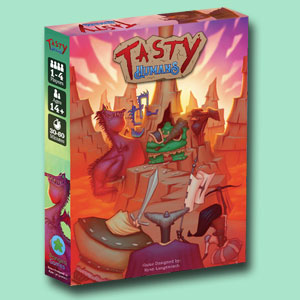How To Be Prolific Without Burning Out
Dev Diary posts are made to teach game development through specific examples from my latest project: Highways & Byways. Just here for Highways & Byways updates? Click here.
When this post goes live, I’ll be asleep. In Hawaii, it will be 4 in the morning. I think it’s a lovely place to celebrate my 25th birthday. I am incredibly privileged to be able to take the week off to do this. In fact, I’m not even having to spend a lot of money either – I racked up a lot of points on my travel card.

Looking for more resources to help you on your board game design journey?
Here you go: no email required!
Like this writing style?
Check out my latest blog on marketing here.
Vacations are important. That’s not just because they’re fun and give you good memories, though these are fine reasons alone and with no other justification. Creative work, especially creative work in a public sphere like what we see on the internet, requires an immense amount of discipline and consistency. Just about everybody I know in the board game industry is squeezing their projects into a busy schedule around a full-time job in order to bankroll their games. Even if that weren’t case, you simply cannot rush this process. It’s not doable. You have to take breaks for your own well-being.
The idea of “treating yourself” has become so cliche that many of the high-achievers I know scoff at it, including myself earlier in the business-building process. There are a lot of people online who will tell you to put in 18 or 19 hours per day every day of the week. That’s stupid. It’s counterproductive. If you don’t believe me, then believe Harvard Business Review.
There is something at the core of the anxious spirit that always wants to be busy. You may fear slowing down because you think others will pass you, only to wind up sabotaging your own efforts. This is the same thing that happens when a marathon runner tries to run too fast and sputters out 10 miles in. Hard work is awesome, but smart hard work is better.
Be a relentless manager of your time. Figure out which activities help you create games, build your online presence, or promote your project most efficiently. At first, this will probably only be 20% of what you do, but it will get you 80% of the benefit. This is called the Pareto Principle. Really lean into that 20% that gets you most of the results. Do more of that and less of the garbage.
This is going to sound really obvious. Maybe I’ll even sound like your mom. Let’s power through it. If you need to sleep, then sleep. Eat three healthy meals per day. Get some exercise. Get some sunshine. Hang out with your friends, your significant other, your family, your kids, or your pets. Do something you always wanted to do just for fun. Your mental health is very important.
I write two blog posts per week, almost all of which are over 1,000 words. I juggle nine social media accounts. I made a board game in under a year from scratch. I manage an online community of over 1,000 people. I crank out blog posts, show up on podcasts, and do live-streams. Sometimes I make new board games.
Guess what? That only takes 25 hours per week most weeks. I just don’t waste time – I’ve nailed down the processes, I focus on what I need to focus on, then I quit and go hang out with people I love, watch a movie, or fly to a tropical island.
It takes a long time to get to the point where you can do this. You will need to practice and you’ll need to constantly be asking “how can I do this more efficiently?” Even after you master it, you’ll occasionally have weeks where you have to work more than 25 hours per week on game stuff. If you do this regularly, though, you need to ask yourself what you can stop doing and what you can outsource.
I’m keeping it short today. Sometimes, you just need a minute. With the Highways & Byways Kickstarter rapidly approaching, that’s where I am right now.
I’d like to conclude by linking you to You Are Not Alone – Pragmatic and Philosophical Tips for Content Creation. This post by Meeple Like Us is what inspired my brief Dev Diary today. Give a read if you get a chance!
Most Important Highways & Byways Updates
- I’M RUNNING A GIVEAWAY ON FACEBOOK!
- Highways & Byways is still being reviewed.
- Throughout the coming months, you’ll see a lot of guest blog posts and podcasts with me in them, talking about Highways & Byways.







